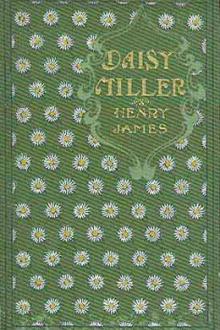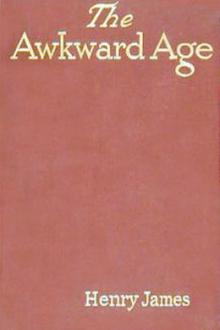author - "Henry James"

Description One of the most famous ghost stories in literature, The Turn of the Screw earned its place in the annals of influential English novellas not for its qualities as a gothic ghost story, but rather for the many complex and subtle ways the reader can come to opposing conclusions as to tale’s very nature. Are the ghosts the governess sees real, or are they figments of her quiet insanity? The Turn of the Screw was originally published as a serial, and later went through many revisions by

rents, her mother within a few months. Mrs. Meldrum had known them, disapproved of them, considerably avoided them: she had watched the girl, off and on, from her early childhood. Flora, just twenty, was extraordinarily alone in the world--so alone that she had no natural chaperon, no one to stay with but a mercenary stranger, Mrs. Hammond Synge, the sister-in-law of one of the young men I had just seen. She had lots of friends, but none of them nice: she kept picking up impossible people. The

tel isn't much; but the piano is better thanthat fearful old thing at the Sebago House. Sometimes I godownstairs and talk to the lady who keeps the books--a French lady,who is remarkably polite. She is very pretty, and always wears ablack dress, with the most beautiful fit; she speaks a littleEnglish; she tells me she had to learn it in order to converse withthe Americans who come in such numbers to this hotel. She has givenme a great deal of information about the position of woman in

daub on the easel."Ask him, then, if he would not like to learn French." "To learn French?" "To take lessons." "To take lessons, my daughter? From thee?" "From you!" "From me, my child? How should I give lessons?" "Pas de raisons! Ask him immediately!" said Mademoiselle Noemie, with soft brevity. M. Nioche stood aghast, but under his daughter's eye he collected his wits, and, doing his best to assume an agreeable smile, he

than anyone else, and we had done it by opening lights into his life. He had nothing to fear from us because he had nothing to fear from the truth, which alone at such a distance of time we could be interested in establishing. His early death had been the only dark spot in his life, unless the papers in Miss Bordereau's hands should perversely bring out others. There had been an impression about 1825 that he had "treated her badly," just as there had been an impression that he had

heir accompaniments, were for about five years a source of extreme satisfaction to the young physician, who was both a devoted and a very happy husband. The fact of his having married a rich woman made no difference in the line he had traced for himself, and he cultivated his profession with as definite a purpose as if he still had no other resources than his fraction of the modest patrimony which on his father's death he had shared with his brothers and sisters. This purpose had not been

ticular, the various hotels at which they had stopped. "That English lady in the cars," she said--"Miss Featherstone-- asked me if we didn't all live in hotels in America. I told her I had never been in so many hotels in my life as since I came to Europe. I have never seen so many--it's nothing but hotels." But Miss Miller did not make this remark with a querulous accent; she appeared to be in the best humor with everything. She declared that the hotels were very good, when

ly no warrant but its splendid impudence. Let us grant then that the impudence is always there--there, so to speak, for grace and effect and ALLURE; there, above all, because the Story is just the spoiled child of art, and because, as we are always disappointed when the pampered don't "play up," we like it, to that extent, to look all its character. It probably does so, in truth, even when we most flatter ourselves that we negotiate with it by treaty.All of which, again, is but to say

e in question at all, and that has condemned the freedom of the circle to be self- conscious, compunctious, on the whole much more timid than brave--the consequent muddle, if the term be not too gross, representing meanwhile a great inconvenience for life, but, as I found myself feeling, an immense promise, a much greater one than on the "foreign" showing, for the painted picture of life. Beyond which let me add that here immediately is a prime specimen of the way in which the

Description The Wings of the Dove is perhaps the most well-received of Henry James’s novels. First published in 1902, it follows Kate Croy and Merton Densher, an engaged couple in late-Victorian London, who meet Milly Theale, a wealthy American heiress. Milly, though young and lively, is burdened with a fatal disease. She wishes to spend her last days on happy adventures through Europe, and her sparkling personality, still bright despite her looming death, quickly makes her a hit in the London

Description One of the most famous ghost stories in literature, The Turn of the Screw earned its place in the annals of influential English novellas not for its qualities as a gothic ghost story, but rather for the many complex and subtle ways the reader can come to opposing conclusions as to tale’s very nature. Are the ghosts the governess sees real, or are they figments of her quiet insanity? The Turn of the Screw was originally published as a serial, and later went through many revisions by

rents, her mother within a few months. Mrs. Meldrum had known them, disapproved of them, considerably avoided them: she had watched the girl, off and on, from her early childhood. Flora, just twenty, was extraordinarily alone in the world--so alone that she had no natural chaperon, no one to stay with but a mercenary stranger, Mrs. Hammond Synge, the sister-in-law of one of the young men I had just seen. She had lots of friends, but none of them nice: she kept picking up impossible people. The

tel isn't much; but the piano is better thanthat fearful old thing at the Sebago House. Sometimes I godownstairs and talk to the lady who keeps the books--a French lady,who is remarkably polite. She is very pretty, and always wears ablack dress, with the most beautiful fit; she speaks a littleEnglish; she tells me she had to learn it in order to converse withthe Americans who come in such numbers to this hotel. She has givenme a great deal of information about the position of woman in

daub on the easel."Ask him, then, if he would not like to learn French." "To learn French?" "To take lessons." "To take lessons, my daughter? From thee?" "From you!" "From me, my child? How should I give lessons?" "Pas de raisons! Ask him immediately!" said Mademoiselle Noemie, with soft brevity. M. Nioche stood aghast, but under his daughter's eye he collected his wits, and, doing his best to assume an agreeable smile, he

than anyone else, and we had done it by opening lights into his life. He had nothing to fear from us because he had nothing to fear from the truth, which alone at such a distance of time we could be interested in establishing. His early death had been the only dark spot in his life, unless the papers in Miss Bordereau's hands should perversely bring out others. There had been an impression about 1825 that he had "treated her badly," just as there had been an impression that he had

heir accompaniments, were for about five years a source of extreme satisfaction to the young physician, who was both a devoted and a very happy husband. The fact of his having married a rich woman made no difference in the line he had traced for himself, and he cultivated his profession with as definite a purpose as if he still had no other resources than his fraction of the modest patrimony which on his father's death he had shared with his brothers and sisters. This purpose had not been

ticular, the various hotels at which they had stopped. "That English lady in the cars," she said--"Miss Featherstone-- asked me if we didn't all live in hotels in America. I told her I had never been in so many hotels in my life as since I came to Europe. I have never seen so many--it's nothing but hotels." But Miss Miller did not make this remark with a querulous accent; she appeared to be in the best humor with everything. She declared that the hotels were very good, when

ly no warrant but its splendid impudence. Let us grant then that the impudence is always there--there, so to speak, for grace and effect and ALLURE; there, above all, because the Story is just the spoiled child of art, and because, as we are always disappointed when the pampered don't "play up," we like it, to that extent, to look all its character. It probably does so, in truth, even when we most flatter ourselves that we negotiate with it by treaty.All of which, again, is but to say

e in question at all, and that has condemned the freedom of the circle to be self- conscious, compunctious, on the whole much more timid than brave--the consequent muddle, if the term be not too gross, representing meanwhile a great inconvenience for life, but, as I found myself feeling, an immense promise, a much greater one than on the "foreign" showing, for the painted picture of life. Beyond which let me add that here immediately is a prime specimen of the way in which the

Description The Wings of the Dove is perhaps the most well-received of Henry James’s novels. First published in 1902, it follows Kate Croy and Merton Densher, an engaged couple in late-Victorian London, who meet Milly Theale, a wealthy American heiress. Milly, though young and lively, is burdened with a fatal disease. She wishes to spend her last days on happy adventures through Europe, and her sparkling personality, still bright despite her looming death, quickly makes her a hit in the London